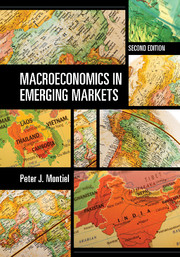Book contents
- Frontmatter
- Contents
- Preface
- PART 1 THE MACROECONOMIC FRAMEWORK
- PART 2 A BENCHMARK MACROECONOMIC MODEL
- PART 3 PUBLIC FINANCE AND MACROECONOMIC PERFORMANCE
- PART 4 MONETARY INSTITUTIONS AND MONETARY POLICY
- PART 5 EXCHANGE RATE MANAGEMENT
- PART 6 THE FINANCIAL SECTOR AND MACROECONOMIC PERFORMANCE
- PART 7 VARIETIES OF EMERGING-MARKET CRISES
- 25 Sovereign Debt Crises
- 26 Banking Crises
- 27 Currency Crises and Crisis Interactions
- 28 Lessons from the Emerging-Market Crises of the 1990s and 2000s
- 29 Lessons from the Great Recession
- Index
- References
25 - Sovereign Debt Crises
Published online by Cambridge University Press: 05 June 2012
- Frontmatter
- Contents
- Preface
- PART 1 THE MACROECONOMIC FRAMEWORK
- PART 2 A BENCHMARK MACROECONOMIC MODEL
- PART 3 PUBLIC FINANCE AND MACROECONOMIC PERFORMANCE
- PART 4 MONETARY INSTITUTIONS AND MONETARY POLICY
- PART 5 EXCHANGE RATE MANAGEMENT
- PART 6 THE FINANCIAL SECTOR AND MACROECONOMIC PERFORMANCE
- PART 7 VARIETIES OF EMERGING-MARKET CRISES
- 25 Sovereign Debt Crises
- 26 Banking Crises
- 27 Currency Crises and Crisis Interactions
- 28 Lessons from the Emerging-Market Crises of the 1990s and 2000s
- 29 Lessons from the Great Recession
- Index
- References
Summary
The process of emergence – of becoming integrated with international financial markets – has not been a smooth one for developing countries. As we have seen over the last several chapters, capital flows to these economies have been episodic, and inflows of foreign capital have often been disruptive, posing significant policy challenges. But even more serious have been the consequences of capital-flow reversals, which have become known as sudden stops. These have often been associated with severe financial crises, which have frequently created substantial economic hardship for emerging-market economies in the form of sharp output contractions.
A financial crisis can loosely be defined in general terms as a situation in which a macroeconomically important economic agent fails to fulfill its financial obligations. Macroeconomically important agents include the government, the central bank, or a significant portion of the banking system. Such agents undertake financial obligations in the form of commitments to exchange financial assets for each other on some preannounced terms, that is, at par. For example, governments commit to redeeming their debt for currency at par, central banks to exchanging domestic currency for foreign currency at par, and banks to exchanging their deposits for currency at par. But it can happen that any of these agents may become unable or unwilling to meet its obligations. This creates a crisis because credible commitments to exchange assets at par sustain the relative values of the assets being exchanged, and the abrogation of such commitments thus gives rise to the prospect of discrete changes in asset prices and large redistributions of financial wealth, creating the incentives for massive portfolio reallocations by individuals seeking to avoid large losses or make large gains.
- Type
- Chapter
- Information
- Macroeconomics in Emerging Markets , pp. 611 - 632Publisher: Cambridge University PressPrint publication year: 2011



